(完整版)新概念英语第二册第二课(包含课文、练习和答案)
- 格式:doc
- 大小:32.51 KB
- 文档页数:5
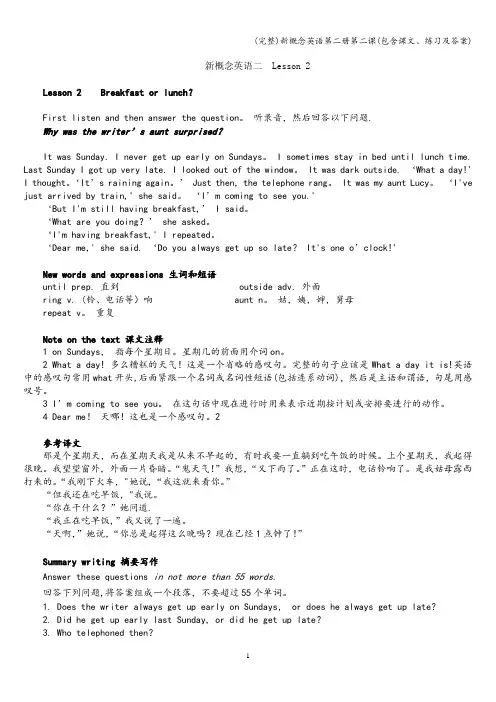
新概念英语二 Lesson 2Lesson 2 Breakfast or lunch?First listen and then answer the question。
听录音,然后回答以下问题.Why was the writer’s aunt surprised?It was Sunday. I never get up early on Sundays。
I sometimes stay in bed until lunch time. Last Sunday I got up very late. I looked out of the window。
It was dark outside. ‘What a day!' I thought。
‘It’s raining again。
’ Just then, the telephone rang。
It was my aunt Lucy。
‘I've just arrived by train,' she said。
‘I’m coming to see you.'‘But I'm still havi ng breakfast,’ I said。
‘What are you doing?’ she asked。
‘I'm having breakfast,' I repeated。
‘Dear me,' she said. ‘Do you always get up so late?It's one o’clock!'New words and expressions 生词和短语until prep. 直到 outside adv. 外面ring v. (铃、电话等)响 aunt n。
姑,姨,婶,舅母repeat v。
重复Note on the text 课文注释1 on Sundays,指每个星期日。
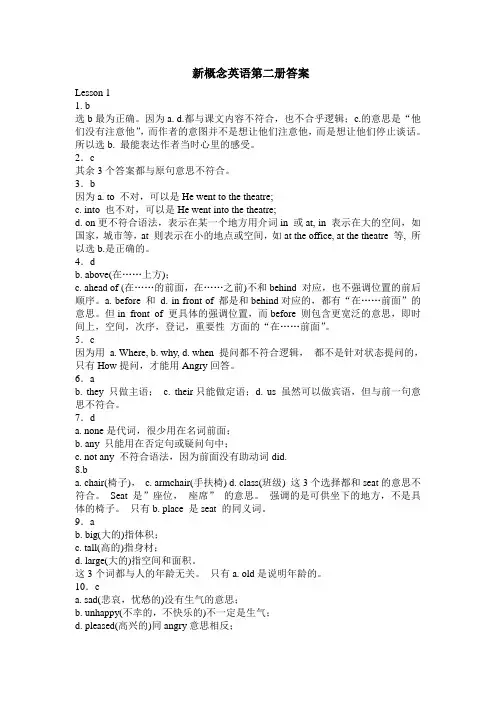
新概念英语第二册答案Lesson 11. b选b最为正确。
因为a. d.都与课文内容不符合,也不合乎逻辑;c.的意思是“他们没有注意他”,而作者的意图并不是想让他们注意他,而是想让他们停止谈话。
所以选b. 最能表达作者当时心里的感受。
2.c其余3个答案都与原句意思不符合。
3.b因为a. to 不对,可以是He went to the theatre;c. into 也不对,可以是He went into the theatre;d. on更不符合语法,表示在某一个地方用介词in 或at, in 表示在大的空间,如国家,城市等,at 则表示在小的地点或空间,如at the office, at the theatre 等, 所以选b.是正确的。
4.db. above(在……上方);c. ahead of (在……的前面,在……之前)不和behind 对应,也不强调位置的前后顺序。
a. before 和d. in front of 都是和behind对应的,都有“在……前面”的意思。
但in front of 更具体的强调位置,而before 则包含更宽泛的意思,即时间上,空间,次序,登记,重要性方面的“在……前面”。
5.c因为用a. Where, b. why, d. when 提问都不符合逻辑,都不是针对状态提问的,只有How提问,才能用Angry回答。
6.ab. they 只做主语;c. their只能做定语;d. us 虽然可以做宾语,但与前一句意思不符合。
7.da. none是代词,很少用在名词前面;b. any 只能用在否定句或疑问句中;c. not any 不符合语法,因为前面没有助动词did.8.ba. chair(椅子),c. armchair(手扶椅) d. class(班级) 这3个选择都和seat的意思不符合。
Seat 是”座位,座席”的意思。
强调的是可供坐下的地方,不是具体的椅子。
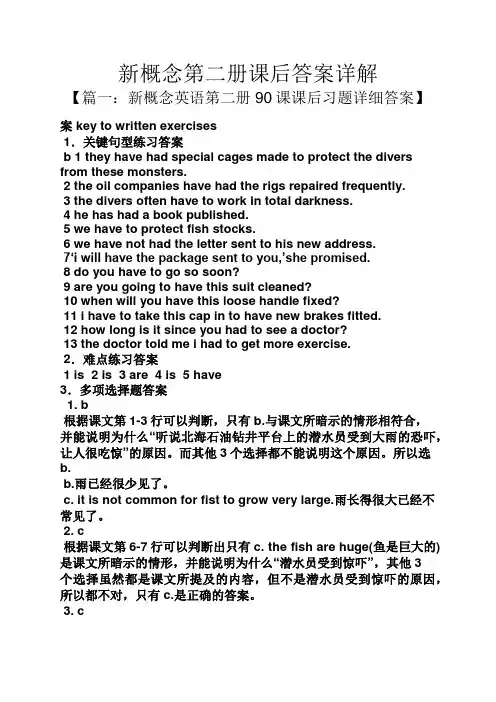
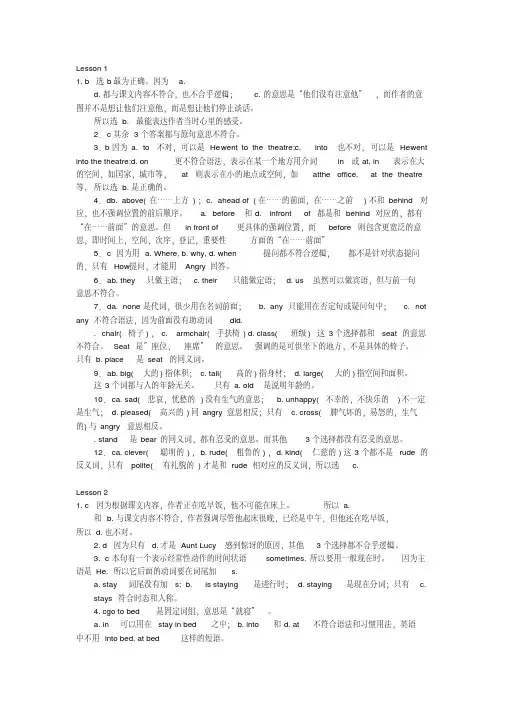
Lesson 11. b选b最为正确。
因为 a.d.都与课文内容不符合,也不合乎逻辑; c.的意思是“他们没有注意他”,而作者的意图并不是想让他们注意他,而是想让他们停止谈话。
所以选 b. 最能表达作者当时心里的感受。
2.c其余3个答案都与原句意思不符合。
3.b因为a. to 不对,可以是He went to the theatre;c. into 也不对,可以是He w ent into the theatre;d. on更不符合语法,表示在某一个地方用介词in 或at, in 表示在大的空间,如国家,城市等,at 则表示在小的地点或空间,如atthe office, at the theatre 等, 所以选 b.是正确的。
4.db. above(在……上方);c. ahead of (在……的前面,在……之前)不和behind 对应,也不强调位置的前后顺序。
a. before 和 d. infront of 都是和behind对应的,都有“在……前面”的意思。
但in front of 更具体的强调位置,而before则包含更宽泛的意思,即时间上,空间,次序,登记,重要性方面的“在……前面”5.c因为用 a. Where, b. why, d. when 提问都不符合逻辑,都不是针对状态提问的,只有How提问,才能用Angry回答。
6.ab. they 只做主语; c. their只能做定语; d. us 虽然可以做宾语,但与前一句意思不符合。
7.da. none是代词,很少用在名词前面; b. any 只能用在否定句或疑问句中; c. not any 不符合语法,因为前面没有助动词did.. chair(椅子), c. armchair(手扶椅) d. class(班级) 这3个选择都和seat的意思不符合。
Seat是”座位,座席”的意思。
强调的是可供坐下的地方,不是具体的椅子。
只有b. place 是seat 的同义词。
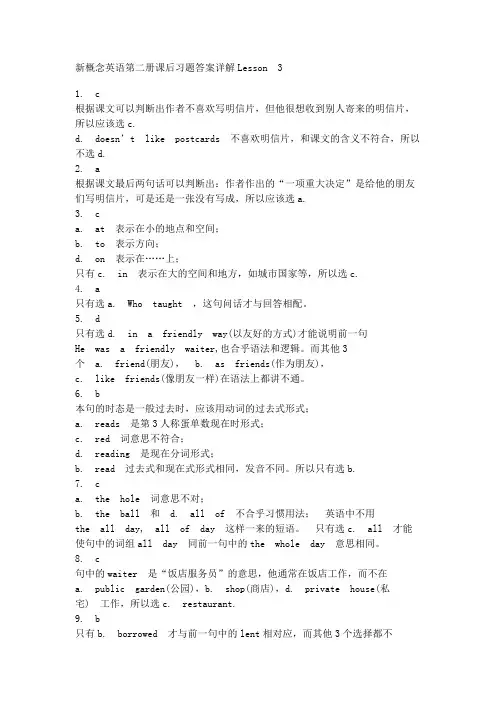
新概念英语第二册课后习题答案详解Lesson 31. c根据课文可以判断出作者不喜欢写明信片,但他很想收到别人寄来的明信片,所以应该选c.d. doesn’t like postcards 不喜欢明信片,和课文的含义不符合,所以不选d.2. a根据课文最后两句话可以判断出:作者作出的“一项重大决定”是给他的朋友们写明信片,可是还是一张没有写成,所以应该选a.3. ca. at 表示在小的地点和空间;b. to 表示方向;d. on 表示在……上;只有c. in 表示在大的空间和地方,如城市国家等,所以选c.4. a只有选a. Who taught ,这句问话才与回答相配。
5. d只有选d. in a friendly way(以友好的方式)才能说明前一句He was a friendly waiter,也合乎语法和逻辑。
而其他3个 a. friend(朋友), b. as friends(作为朋友),c. like friends(像朋友一样)在语法上都讲不通。
6. b本句的时态是一般过去时,应该用动词的过去式形式;a. reads 是第3人称蛋单数现在时形式;c. red 词意思不符合;d. reading 是现在分词形式;b. read 过去式和现在式形式相同,发音不同。
所以只有选b.7. ca. the hole 词意思不对;b. the ball 和 d. all of 不合乎习惯用法;英语中不用the all day, all of day 这样一来的短语。
只有选c. all 才能使句中的词组all day 同前一句中的the whole day 意思相同。
8. c句中的waiter 是“饭店服务员”的意思,他通常在饭店工作,而不在a. public garden(公园),b. shop(商店),d. private house(私宅) 工作,所以选c. restaurant.9. b只有b. borrowed 才与前一句中的lent相对应,而其他3个选择都不是。
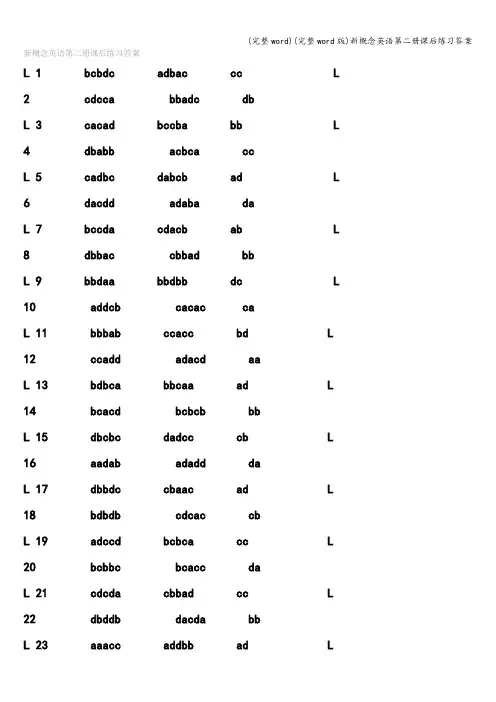
新概念英语第二册课后练习答案L 1 bcbdc adbac cc L 2 cdcca bbadc dbL 3 cacad bccba bb L 4 dbabb acbca ccL 5 cadbc dabcb ad L 6 dacdd adaba daL 7 bccda cdacb ab L 8 dbbac cbbad bbL 9 bbdaa bbdbb dc L 10 addcb cacac caL 11 bbbab ccacc bd L 12 ccadd adacd aaL 13 bdbca bbcaa ad L 14 bcacd bcbcb bbL 15 dbcbc dadcc cb L 16 aadab adadd daL 17 dbbdc cbaac ad L 18 bdbdb cdcac cbL 19 adccd bcbca cc L 20 bcbbc bcacc daL 21 cdcda cbbad cc L 22 dbddb dacda bbL 23 aaacc addbb ad L24 baaca acccb abL 25 cbbab cdbaa da L26 adcba ddabd bdL 27 dcddd baddc cc L28 cdbbc dbdcd baL 29 bccbd babbb cc L30 aadab cccda ddL 31 dbaca adabc ac L32 cccbb cadad bcL33 dbdac bbccc ac L34 dabca dcbcb caL35 adadd adaba dd L36 addcd ccbad ccL37 cbbbb dacda ba L38 bcaac bddba ddL39 dacdd abacc ab L40 ccbca acbbb bdL41 aacdc bbada cb L42 dddbb cddac daL43 bbaad daccd ac L44 cbccc bdaba bdL45 bdabb dcbcb db L46 acddaL47 dabad aaddc ac L48 cbcba cbbda bcL49 dabab ccacc aa L50 bdacc aadbb cdL51 bcddd adcad db L52 bccab dcbac bdL53 cdacc cdcda cc L54 dbdbd badcb ddL55 aabda acabd ab L56 cacca cabbc ccL57 abbbb dcdcb da L58 bdaac bdcad bdL59 dbddd abada ab L60 bacbc babac adL61 bacca dcabb dd L62 addcd ccbda dbL63 dbaab ddacd ca L64 ccccb bccab bbL65 adbbc aadcc bd L66 cbaad aabdb baL67 daddd dbbad dd L68 bbcdb bbccc aaL69 abcbb ddaab cd L70 dbccdL71 bdbbc cdbbb ba L72 acadb accdb adL73 cadac dadaa db L74 bdccd cacbc abL75 cabdb abbdd cc L76 dbdaa bbacb ddL77 acabc dddaa ba L78 acbbc acbab caL79 bdcca dbadb ac L80 cbdad cadcc dbL81 daadb bdcbd bd L82 abadc cdaac bdL83 bacca bcbcd ab L84 ccabd cccda cdL85 ddbab abdbb dc L86 bcabb bdcab bcL87 cdcda ccada ad L88 cbbcc abbcc cbL89 aadad dadbd db L90 bccca bcbad ddL91 dbcbc dbbcb cb L92 bcdcb abbad caL93 cdbac dbbcb cb L94 abcbaL95 dabad cdcac dc L96 dccba dcdab cb。
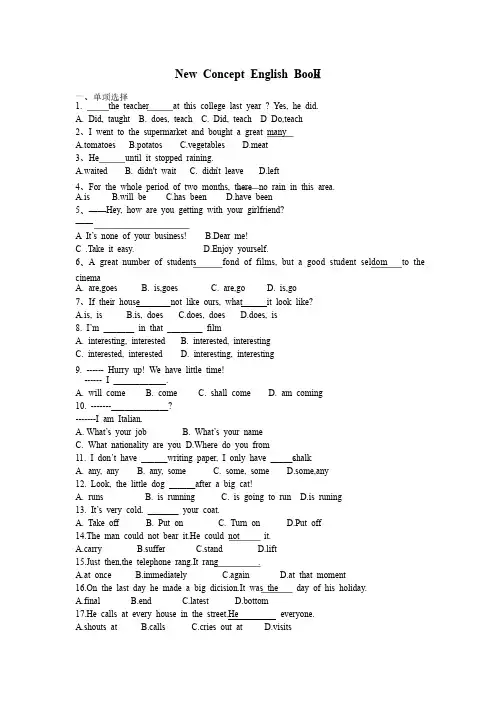
New Concept English Book Ⅱ一、单项选择一、单项选择 1. the teacher at this college last year ? Yes, he did. A. Did, taught B. does, teach C. Did, teach D Do,teach 2、I went to the supermarket and bought a great many A.tomatoes B.potatos C.vegetables D.meat 3、He until it stopped raining. A.waited B. didn't wait C. didn ’t leave D.left 4、For the whole period of two months, there no rain in this area. A.is B.will be C.has been D.have been 5、——Hey, how are you getting with your girlfriend? ————A .I t’s none of your business! It’s none of your business! B.Dear me! C .Take it easy. D.Enjoy yourself. 6、A great number of students fond of films, but a good student seldom to the cinema A. are,goes B. is,goes C. are,go D. is,go 7、If their house not like ours, what it look like? A.is, is B.is, does C.does, does D.does, is 8. I’m _______ in that ________ filmA. interesting, interested B. interested, interesting C. interested, interested D. interesting, interesting 9. ------ Hurry up! We have little time! ------ I ____________. A. will come B. come C. shall come D. am coming 10. -------_____________? -------I am Italian. A. What’s your job B. What’s your name C. What nationality are you D.Where do you from 1111. I don’t have ______writing paper, I only have _____chalk . I don’t have ______writing paper, I only have _____chalks. A. any, any B. any, some C. some, some D.some,any 12. Look, the little dog ______after a big cat! A. runs B. is running C. is going to run D.is runing 1313. It’s very cold. _______ your coat. . It’s very cold. _______ your coat. A. Take off B. Put on C. Turn on D.Put off 14.The man could not bear it.He could not it. A.carry B.suffer C.stand D.lift 15.Just then,the telephone rang.It rang . A.at once B.immediately C.again D.at that moment 16.On the last day he made a big dicision.It was the day of his holiday. A.final B.end test D.bottom 17.He calls at every house in the street.He everyone. A.shouts at B.calls C.cries out at D.visits 18.The detectives were a valuable parcel of diamonds. A.expecting B.waiting C.expecting for D.expecting to 19.The man is fond of gardens. . A.They like him B.They like to him C.He likes them D.He likes they 20.How many times did the clock . A.hit B.beat C.knock D.strike 二、用一般过去和过去进行时填空. 21. I (fall) when I (skate). 22. While Tome and Jerry (eat), they (hear) a strane noise. 23. Julie (see) something weird when she (walk) in the park. 24. Mr. White (walk) in the street when it (start) to rain. 25. When David (come) home, John (make) dinner. 三、用三、用 over, between, along, in front of, behind, 或 across 等介词或介词短语填空等介词或介词短语填空26. A lot of birds are flying _______ the river. 27. The teacher is standing ___________ the blackboard. 28. I am running _______ the Great Wall(长城). 29. They are swimming _____ the river. 30. I am sitting ________my brother and my sister. 四、用所给单词的适当形式填空:四、用所给单词的适当形式填空:31、He is not very (friend) towards newcomers(新来的). 32、She slammed the telephone down (angry). 33、It was a sudden (decide) 34、She works for that restaurant as a (waiter) 35、She is very (exciting) about winning the first prize. 36、What have you been done (late). 37、We are very (please) with our new house. 38、She ( rare) visited her aunt. 39、“What do you want ?”She asked (rude) 40、I had a long (converse) with her the other day (不久前一天). 五、词组互译五、词组互译41、none of your business 42、和某人谈话、和某人谈话43、在回家的路上、在回家的路上44、by the way 45、注意、注意六、阅读理解六、阅读理解How How many many many different different different languages languages languages are are are spoken spoken spoken in in in the the the world world world today? today? today? There There There are are are about about about 5,000 5,000 5,000 different different languages. Nearly 900 languages are spoken in India .Chinese is the language spoken by the biggest number of people in the world .But the most widely spoken language in the world is English .300,000,000 people speak English as a first language .Nearly twice as many--about 650 million people speak it as a foreign language .How many words are there in the English language? There are about 490,000.Also ,there are about 300,000 words used in science(科技).There are more words in English than in any other language .But most people use no more than 60,000 words .Children ,leaving school at the age of 1 6,know about 1 5,000 words .1.The Chinese language is spoken ________. A.in most countries in the world B.in 600 countries C.by the biggest number of people in the world 2.About 650 million people speak English as________.A.a first language B.well as the native speakers C.a second language 3.Only ________ English words are used by most people .A.six thousand B.three hundred thousand C.sixty thousand 4.Children ________ know about 15,000 words .A.who start school at the age of 6 B.who study at school C.who finish school at sixteen 5.5.Which of the following is true’Which of the following is true’A.There are no more than 5,000 different languages in the world .B.English is the most widely-used language .C.The Indian people speak 800 languages .One day a poor student was walking through a town. He had not had anything to eat for several days and he was very hungry. And when he saw a man selling homemade hamburgers, he let out a scream and fell to the ground. When the surprised seller asked the student what the matter was, the student answered, “I don’t like hamburgers. In fact, I hate them. Whenever I see them, I feel ill and can’t eat.”The The hamburger hamburger hamburger seller seller seller then then then thought thought thought that that that he he he would would would play play play a a a joke joke joke on on on the the the student. student. student. He He He put put put ten ten hamburgers hamburgers in in in the the the comer comer comer of of of a a a room room room and and and then then then locked locked locked the the the student student student in in in it. it. it. After After After a a a short short short time, time, time, the the hamburger seller opened the door of the room. He was surprised to find that the student had eaten all all the the the hamburgers. hamburgers. hamburgers. The The The student student student explained. explained. explained. “For “For “For some some some strange strange strange reason, reason, reason, I I I suddenly suddenly suddenly decided decided decided that that that I I liked hamburgers.”The hamburger seller was angry that the student had fooled him. He asked what other things he he did did did not not not like like like to to to eat. eat. eat. “Oh, “Oh, “Oh, I I I like like like everything, everything, everything, ”answered ”answered ”answered the the the student, student, student, “Except “Except “Except at at at the the the moment moment moment I I would hate to drink two cups of good strong tea!”6. The student was very hungry because . A.he was ill B.he had not eaten for a long time C.he saw the hamburgers 7. The hamburger seller wanted to the student. A.help B,pull up C.play a joke on 8. The hamburger seller was surprised to find the student had eaten hamburgers. A.ten B.five C.two 9. In fact, . A.the seller wanted to sell some hamburgers to the student B.the student really hated hamburgers C.the student fooled the hamburger seller 10. The student . A.wanted some tea B.B.didn’t like tea didn’t like tea C.hated strong tea George works in a factory. He was born in a very poor family and was in school for only four years. He has to do the hard work, but he is paid less because of this. He likes to watch football matches very much and spends much time on it. One evening there was a big football match on a playground. He borrowed some money from his friend and hurried there. There were a lot of people there. And all the tickets were sold out. He was was sorry sorry sorry for for for it. it. it. He He He saw saw saw a a a pole(pole(电线杆)outside )outside the the the playground playground playground and and and climbed climbed climbed it it it up up up quickly. quickly. quickly. A A policeman came and said. “It’s dangerous to stay on it! Come down!”“Wait a minute, please!” George said and just at that moment the policeman heard cheers in the playground and asked in a hurry. “Which team has kicked a goal?” “Ours!” “Wonderful!You can stay there. But take care!” the policeman s aid happily and left. When the match would soon be over, he came back again and asked ,“Who’s won?” “Theirs, 3-2.” “Come down, ”the policeman said a n grily, “Such a match isn’t worth watching!”ngrily, “Such a match isn’t worth watching!”George had to come down. But soon they heard cheers again. The policeman said in a hurry, “Climb up quickly and see who’s kicked a goal!”11. George is paid less because he didn’t learn much when he was young . A.Right B.Wrong C.C.Doesn’t say Doesn’t say12. George climbed up the pole because he hoped to save some money. A.Right B.Wrong C.C.Doesn’t say Doesn’t say13. 13. The The The policeman policeman policeman soon soon soon changed changed changed his his his mind mind mind at at at the the the first first first time time time because because because he he he thought thought thought it it it was was was safe safe safe for for George to be on the pole. A.Right B.Wrong C.C.Doesn’t say Doesn’t say14. The policeman became angry when he heard their team had lost the game. A.Right B.Wrong C.C.Doesn’t say Doesn’t say15. Both George and the policeman are football fans. A.Right B.Wrong C.C.Doesn’t say Doesn’t say七、完型填空七、完型填空Mrs. Williams loved flowers and had a small __1__ beautiful garden .In the summer ,her roses were always the __2__ in her street .0ne summer afternoon her __3__ rang ,and when she went to the front door ,she saw a small boy outside .He was about seven years old .and was holding a big bunch(束)of beautiful roses in his hand .“I __4__ roses, ” he said.One shilling __5__ a big .“Do you want any? They are quite cheapbunch.They are fresh(新鲜).I __6__ them this afternoon.” ’“My boy,” Mrs. Williams answered,“I pick __7__ whenever I want,and don’t pay __8__ for them,because I have lots in my garden.”----__10__ they “Oh,no,you haven’t,”said the small boy.“There __9__ any roses in your garden are here in my hand!”1.A and B or C but 2.A better B worst C best 3.A bell B telephone C door 4.A sell B sold C am selling 5.A for B by C in 6.A brought B took C picked 7.A flowers B roses C a flower 8.A nothing B something C anything 9.A haven't B won’t C aren’t10.A so B and C because 。
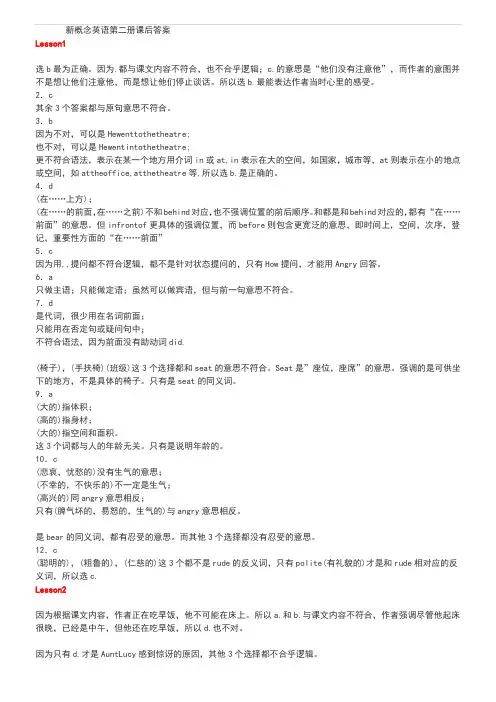
新概念英语第二册课后答案Lesson1选b最为正确。
因为.都与课文内容不符合,也不合乎逻辑;c.的意思是“他们没有注意他”,而作者的意图并不是想让他们注意他,而是想让他们停止谈话。
所以选b.最能表达作者当时心里的感受。
2.c其余3个答案都与原句意思不符合。
3.b因为不对,可以是Hewenttothetheatre;也不对,可以是Hewentintothetheatre;更不符合语法,表示在某一个地方用介词in或at,in表示在大的空间,如国家,城市等,at则表示在小的地点或空间,如attheoffice,atthetheatre等,所以选b.是正确的。
4.d(在……上方);(在……的前面,在……之前)不和behind对应,也不强调位置的前后顺序。
和都是和behind对应的,都有“在……前面”的意思。
但infrontof更具体的强调位置,而before则包含更宽泛的意思,即时间上,空间,次序,登记,重要性方面的“在……前面”5.c因为用,,提问都不符合逻辑,都不是针对状态提问的,只有How提问,才能用Angry回答。
6.a只做主语;只能做定语;虽然可以做宾语,但与前一句意思不符合。
7.d是代词,很少用在名词前面;只能用在否定句或疑问句中;不符合语法,因为前面没有助动词did.(椅子),(手扶椅)(班级)这3个选择都和seat的意思不符合。
Seat是”座位,座席”的意思。
强调的是可供坐下的地方,不是具体的椅子。
只有是seat的同义词。
9.a(大的)指体积;(高的)指身材;(大的)指空间和面积。
这3个词都与人的年龄无关。
只有是说明年龄的。
10.c(悲哀,忧愁的)没有生气的意思;(不幸的,不快乐的)不一定是生气;(高兴的)同angry意思相反;只有(脾气坏的,易怒的,生气的)与angry意思相反。
是bear的同义词,都有忍受的意思。
而其他3个选择都没有忍受的意思。
12.c(聪明的),(粗鲁的),(仁慈的)这3个都不是rude的反义词,只有polite(有礼貌的)才是和rude相对应的反义词,所以选c.Lesson2因为根据课文内容,作者正在吃早饭,他不可能在床上。
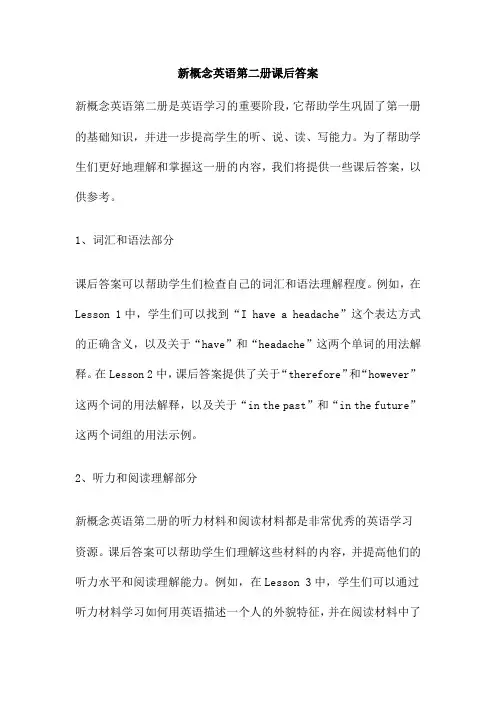
新概念英语第二册课后答案新概念英语第二册是英语学习的重要阶段,它帮助学生巩固了第一册的基础知识,并进一步提高学生的听、说、读、写能力。
为了帮助学生们更好地理解和掌握这一册的内容,我们将提供一些课后答案,以供参考。
1、词汇和语法部分课后答案可以帮助学生们检查自己的词汇和语法理解程度。
例如,在Lesson 1中,学生们可以找到“I have a headache”这个表达方式的正确含义,以及关于“have”和“headache”这两个单词的用法解释。
在Lesson 2中,课后答案提供了关于“therefore”和“however”这两个词的用法解释,以及关于“in the past”和“in the future”这两个词组的用法示例。
2、听力和阅读理解部分新概念英语第二册的听力材料和阅读材料都是非常优秀的英语学习资源。
课后答案可以帮助学生们理解这些材料的内容,并提高他们的听力水平和阅读理解能力。
例如,在Lesson 3中,学生们可以通过听力材料学习如何用英语描述一个人的外貌特征,并在阅读材料中了解如何用英语描述一个城市的天气情况。
在Lesson 4中,学生们可以通过阅读材料了解如何用英语描述一个人在工作中取得的成功和失败。
3、写作部分新概念英语第二册的写作部分是非常重要的学习内容。
课后答案可以帮助学生们检查自己的写作水平,并提高他们的写作能力。
例如,在Lesson 5中,学生们可以参考课后答案中的范文,学习如何写一封感谢信。
在Lesson 6中,学生们可以通过范文学习如何写一篇日记。
新概念英语第二册课后答案是学生们学习英语的重要工具。
通过这些答案,学生们可以更好地理解课程内容,提高自己的听、说、读、写能力,并为将来的英语学习打下坚实的基础。
新概念英语第二册课文新概念英语第二册课文是英语学习的重要部分,它涵盖了各种类型的文章,包括说明文、议论文、记叙文等。
这些课文不仅有助于提高学生的阅读理解能力,还可以帮助他们提高写作和口语能力。
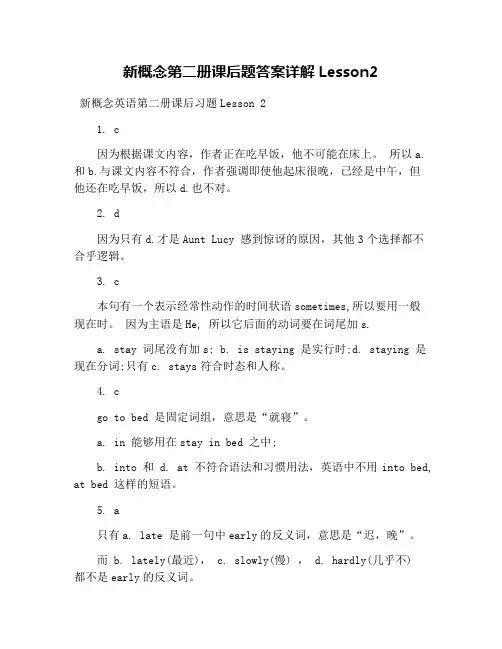
新概念第二册课后题答案详解Lesson2新概念英语第二册课后习题Lesson 21. c因为根据课文内容,作者正在吃早饭,他不可能在床上。
所以a. 和b.与课文内容不符合,作者强调即使他起床很晚,已经是中午,但他还在吃早饭,所以d.也不对。
2. d因为只有d.才是Aunt Lucy 感到惊讶的原因,其他3个选择都不合乎逻辑。
3. c本句有一个表示经常性动作的时间状语sometimes,所以要用一般现在时。
因为主语是He, 所以它后面的动词要在词尾加s.a. stay 词尾没有加s;b. is staying 是实行时;d. staying 是现在分词;只有c. stays符合时态和人称。
4. cgo to bed 是固定词组,意思是“就寝”。
a. in 能够用在stay in bed 之中;b. into 和 d. at 不符合语法和习惯用法,英语中不用into bed, at bed 这样的短语。
5. a只有a. late 是前一句中early的反义词,意思是“迟,晚”。
而 b. lately(最近), c. slowly(慢) , d. hardly(几乎不)都不是early的反义词。
6. b此问句的回答是By train ,是表示方式的,意思是乘火车来的。
只有b. How才能对句子中表示方式的部分实行提问。
而a. When是就时间提问的; c. Why是就原因提问的;d. where 是就地点提问的。
7. b如果填a. still句子不符合语法规则,也不符合逻辑; 选c.often 和 d. always 也不符合逻辑。
只有填b. now 句子才符合逻辑:他现在不能见他姑妈,因为他正在吃早饭。
8. a4个选择都有看的意思。
Look 的词意思是“看,望”强调看的动作,常和介词at, outof 等连用;See 的词意思是“看到,见到”强调结构,后面要带宾语;Watch的词意思是“观看,注视”多用来指看戏剧,电视节目等,是及物动词,如watch TV, watch a play;Remark 的词意思是“注意到,觉察到”也强调结果。
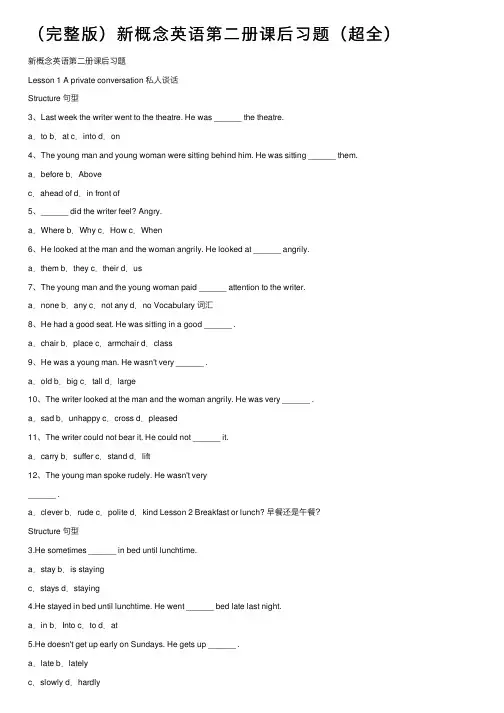
(完整版)新概念英语第⼆册课后习题(超全)新概念英语第⼆册课后习题Lesson 1 A private conversation 私⼈谈话Structure 句型3、Last week the writer went to the theatre. He was ______ the theatre.a.to b.at c.into d.on4、The young man and young woman were sitting behind him. He was sitting ______ them. a.before b.Abovec.ahead of d.in front of5、______ did the writer feel? Angry.a.Where b.Why c.How c.When6、He looked at the man and the woman angrily. He looked at ______ angrily.a.them b.they c.their d.us7、The young man and the young woman paid ______ attention to the writer.a.none b.any c.not any d.no Vocabulary 词汇8、He had a good seat. He was sitting in a good ______ .a.chair b.place c.armchair d.class9、He was a young man. He wasn't very ______ .a.old b.big c.tall d.large10、The writer looked at the man and the woman angrily. He was very ______ .a.sad b.unhappy c.cross d.pleased11、The writer could not bear it. He could not ______ it.a.carry b.suffer c.stand d.lift12、The young man spoke rudely. He wasn't very______ .a.clever b.rude c.polite d.kind Lesson 2 Breakfast or lunch? 早餐还是午餐?Structure 句型3.He sometimes ______ in bed until lunchtime.a.stay b.is stayingc.stays d.staying4.He stayed in bed until lunchtime. He went ______ bed late last night.a.in b.Into c.to d.at5.He doesn't get up early on Sundays. He gets up ______ .6.______ did Aunt Lucy come? By train.a.When b.How c.Why d.Where7.The writer can't see Aunt Lucy ______ He's having breakfast.a.still b.now c.often d.always Vocabulary 词汇8.He ______ out of the window and saw that it was raining.a.looked b.Sawc.remarked d.watched9.Just then, the telephone rang. It rang ______ .a.at once b.immediatelyc.again d.at that moment10.She was his aunt, so he was her ______ .a.son b.grandsonc.nephew d.niece11.Breakfast is the first ______ of the day.a.food b.dinner c.lunch d.meal12.Aunt Lucy said, ‘Dear me, ’ because she was ______ .a.angry b.Surprisedc.tired d.pleasedLesson 3 Please send me a card 请给我寄⼀张明信⽚Structure 句型/doc/24c9eb2d091c59eef8c75fbfc77da26924c59663.html st week he went to Italy. He was _________ Italy last summer.a.atb.toc.ind.on4.____________ him a few words of Italian? The writer.a.Who taughtb.Who did teachc.What did he teachd.Whom did he teach5.He was a friendly waiter. He spoke to the writer _________.a.friendb.as friends6.The writer __________ a few lines, but he didn't understand a word.a.readsb.readc.redd.reading7.He spent the whole day in his room. He was in his room _________ day.a.the holeb.the allc.alld.all ofVocabulary 词汇8.A waiter usually works in a __________.a.public gardenb.shopc.restaurantd.private house9.The waiter lent him a book. He _______ a book from the waiter.a.lentb.borrowedc.tookd.stole10.On the last day he made a big decision. It was the _______ day of his holiday.a.finalb.end/doc/24c9eb2d091c59eef8c75fbfc77da26924c59663.html testd.bottom11.He made a big decision. He _________.a.thought about itb.made up his mindc.changed his mindd.made a wish12.He didn't write a single card. So he __________.a.wrote only oned.wrote all the cards except one☆Lesson 4 An exciting trip 激动⼈⼼的旅⾏Lesson 5 No wrong numbers ⽆错号之虞3.Mr.Scott has a garage. The garage is .A.to himB.of himC.of hisD.his4.Mr.Scott cannot get a telephone for his garage._______he has just bought twelve pigeons.A.That's soB.That's whyC.BecauseD.For5.He has just bought twelve pigeons. When did he_______them?A.boughtB.buysC.buyD.buying6.What's the distance from Pinhurst to Silbury?How_______is Pinhurst_______Silbury?A.long ago ... untilB.long ... awayC.away ... tillD.far ... from7.The pigeon flew from one garage to theother_______three minutes.A.inB.intoC.withD.on8.Mr.Scott has a garage in Silbury. His_______garageis in Pinhurst.A.anotherD.different9.Mr.Scott can't get a telephone. Telephones arehard to .A.takeB.receiveC.obtainD.find10.He has sent requests for spare parts. He has spare parts.A.askedB.asked forC.beggedD.pleased11.Urgent messages are important, so they must besent .A.quicklyB.slowlyC.byhand /doc/24c9eb2d091c59eef8c75fbfc77da26924c59663.html rgely 12.Mr.Scott's ‘telephone service' is private. Itis .A.generalB.spareC.secretD.his ownLesson 6 Percy buttons 珀西·巴顿斯3.The writer has just moved to a new house. Shewas_______yesterday.A.at houseB.to the houseC.at homeD.in the home4.She gave .A.to him a mealD.a meal to him5.A neighbor told me about him. He PercyButtons was a beggar.A.toldB.said meC.told to meD.said6.Everybody knows him. know him.A.They allB.EachC.EveryD.All they7. does he call? Once a month.A.How seldomB.How longC.How soonD.How often8.A beggar is a person who .A.asks for money but doesn't workB.asks for foodC.works hardD.is out of work9.You can have a meal .A.only in the morningB.at any timeC.only at middayD.only in the evening10.She gave him a piece of cheese. He put the_______of cheese in his pocket.A.bitB.barC.blockD.packet11.He calls at every house in the street. He_______everyone.C.cries out atD.visits12.All the houses in our are the same age and size.A.streetB.wayC.roadD.routeLesson 7 Too late 为时太晚3. were detectives waiting? At the airport.A.WhyB.WhenC.WhereD.What4. were they expecting? A valuable parcel of diamonds.A.WhyB.WhenC.WhereD.What5.Someone had told the police that thieves would try to steal the diamonds. This happened the plane arrived.A.beforeB.afterC.whenD.as soon as6.The detectives went into the building and waited .A.inB.intoC.insideD.for7.Two men took the parcel, off the plane. They .A.took off itB.it took offC.took offD.took it offB.waitingC.expecting forD.expecting to9.The parcel was valuable. It was .A.worthB.worthyC.preciousD.value10.The thieves wanted to the diamonds.A.robB.stealC.take fromD.take to11.The detectives waited inside the main building.This was the building.A.most importantB.smallestC.firstD.greatest12.Someone had filled the parcel with stones and sand.It was stones and sand.A.full withB.full ofC.full byD.full inLesson 8 The best and the worst 最好的和最差的3.Bill Frith's garden is larger than Joe's. Itis_______./doc/24c9eb2d091c59eef8c75fbfc77da26924c59663.html rger garden B.a large garden/doc/24c9eb2d091c59eef8c75fbfc77da26924c59663.html rge garden /doc/24c9eb2d091c59eef8c75fbfc77da26924c59663.html rgest garden 4.Bill is a hard worker. He works than Joe.C.more hardlyD.hardier5.Joe's garden is more interesting_______Bill's.A.byB.forC.thanD.from6.The writer is fond of gardens.A.They like himB.They like to himC.He likes themD.He likes7.Joe's garden is the best in the town. It's the best them all.A.inB.ofC.forD.by8.Joe wins every time. He always BillFrith.A.winsB.beatsC.gainsD.earns9.Joe grows more flowers. More flowers inhis garden.A.growB.grow tallC.grow upD.grow big10.Joe's garden is interesting. Joe is in gardening.A.interestingB.interestC.interestinglylook after a garden.A.a hard workB.a hard jobC.hard jobD.hardly a job 12.Every year the writer enters for the garden competitionA.veryB.alsoC.andD.eitherLesson 9 A cold welcome 冷遇3.They went to the Town Hall on Wednesday evening. They went .A.the eveningB.on the eveningC.eveningD.in the evening4.The people under the Town Hall clock.A.wereB.wasC.isD.be5. will it strike? In twenty minutes'time.A.WhenB.How longC.How long agoD.How much 6.What time did it stop? five to twelve. A.OnB.AtC.InD.During7.Did happen? No, nothing happened. A.nothing B.anything C.anyD.a thing 8.How many times did the clock .A.hitB.beatC.knockC.passedD.pasted10.A clock usually has two hands, a minute hand and hand.A.a secondB.an hourC.a timeD.a big11.Most people wear or carry . A.an alarm clock B.an alarm C.a clock D.a watch12.It refused to welcome the New Year. It . A.denied it B.wanted to C.didn't want to D.wished to Lesson 10 Not for jazz 不适于演奏爵⼠乐 3.Our clavichord is kept in the living room. That's where we it.A.keptB.have keptC.are keepingD.keep4.It has belonged to our family for years. It'sthe .A.familiesB.families'C.family'sD.familys'5.The family have had the clavichord many years.A.sinceB.forC.fromD.by 6.Who it? Grandfather did. A.buyB.was boughtC.boughtD.did buy7.We are not allowed to touch it.We ______ touch it. a.mustn'tb.mustn't toc.haven't tod.don't have to 8.What's it ? A clavichord.A.toldB.saidD.spoken 9.It's kept in the living room.That's where we __ it. A.have B.holdC.liftD.carry 10.The visitor damaged it.She ______ it.A.hurtB.painedC.brokeD.destroyed 11.Recently itwasdamaged. Shedamagedit ./doc/24c9eb2d091c59eef8c75fbfc77da26924c59663.html te/doc/24c9eb2d091c59eef8c75fbfc77da26924c59663.html stly/doc/24c9eb2d091c59eef8c75fbfc77da26924c59663.html telyD.finally12.A friend of my father's is the clavichord. A.mendingB.makingC.doingD.building☆Lesson 11 One good deserves another 礼尚往来 Lesson 12 Goodbye and good luck 再见,⼀路顺风 9.It has sailed across the Atlantic many times.It has sailed across the Atlantic ______ .A.sometimesB.alwaysC.often/doc/24c9eb2d091c59eef8c75fbfc77da26924c59663.html ually☆Lesson 13. The Greenwood Boys 绿林少年Lesson 14. Do you speak English? 你会讲英语吗? Structure 句型3.What kind of car did he ______ ? a .drive b .drove c .drivend .driving4.As soon as he had got into the car, I said good morning. I said good morning ______ he had got into the car.a .Beforeb .a long time afterc .just afterd .a moment before 5‘Good morning,’I ______ .b .talkedc .toldd .said6.I speak a few words of French. I don't know ______French.a .manyb .muchc.plenty of d.a little7.Neither of us spoke. We ______ .a.neither spoke b.either spokec.both didn't speak d.neither didn't speakVocabulary词汇8.On the way, a young man waved to me. This happened ______ . a.before the writer's journeyb.during the writer's journeyc.after the writer's journeyd.a long time ago9.The young man waved to the writer. He ______ him.a.saluted b.greetedc.signalled to d.nodded10.He asked for a lift. He was a ______.a.tramp b.hitch hikerc.passenger d.foreigner11.He replied in French. He ______ the writer in French. a.responded b.answeredc.returned d.remarked12.The writer had ______ reached the town when the young man spoke. a.often b.almostc.sometimes d.just asLesson 15 Good news 佳⾳Structure 句型3‘Mr. Harmsworth ______ see you,’the secretary said.a.Would b.shallc.Will d.could4.______ did he feel? Very nervous.a.What b.Howc.How much d.Which5.The firm couldn't pay ______ large salaries.a.so b.such ac.such d.a such6.______ turn is it? It's your turn.a.Which b.To whomc.Whom d.Whose7‘Mr. Harmsworth,’I said ______ a weak voice.a.in b.withc.on d.underVocabulary 词汇8.Mr. Harmsworth wanted to see me. He wanted to______ me.a.watch b.look atc.look for d.speak to9.I felt nervous because I felt ______ .a.angry b.crossc.anxious d.ill10.It's your turn. ______ .a.It's your line b.It's your rowc.You're next d.It's your chance11.Don't interrupt!Don't ______ .a.speak b.talkc.talk while I'm talking d.cut off12.The writer would receive an extra £1, 000.a year. He would get£1, 000.a year ______ . a.less b.morec.over d.upLesson 16 A polite request 彬彬有礼的要求Structure 句型3.If you park your car in the right place you ______ receive a ticket.a.will b.wouldn'tc.didn't d.won't4.Traffic police never let you ______ without a ticket.a.go b.to goc.going d.have gone5.We welcome you to our city. You ______ to our city. a.welcome b.are welcomec.have welcomed d.are welcoming6‘No Parking’means ______ .a.don't leave your car hereb.without parkingc.don't stopd.there's no room to park here7.This note is only a reminder. It's ______ .a.nothing b.no onec.nothing extra d.nothing moreVocabulary 词汇8.This is a‘No Parking’area. Cars aren't allowed in this ______ . a.district b.countryc.surrounding d.kingdom9.You will enjoy your stay. It will ______ you.a.amuse b.enjoyc.laugh at d.please10.You will enjoy your stay. How long will you ______ here? a.rest b.prevent c.sit d.remain11.This note is only a reminder. It will help ______ .a.you remind b.your souvenirc.your remembrance d.you to remember12.You cannot fail to obey it. You can't ______ to do this. a.refuse b.denyc.resist d.withdrawLesson 17 Always young 青春常驻Structure 句型3.She must be at least thirty-five years old. In my opinion she ______ .a.hasb.isc.cand.must4.______is she?At least thirty-five years old.A.HowB.How bigC.How muchD.How old5.she must appear in a bright red dress.She will be dressed ______ red.A.withB.onC.inD.by6.she must appear in a bright red dress.That's what she ______ .A.has doneB.have to doC.has to doD.had done7.She had to wear short socks. It was ______ for her to wear them.a.certainb.necessaryc.importantd.impossibleVocabulary 词汇8.She often appears as a young girl. She ______ on the stage as a young girl.a.is presentedb.pointsc.showd.seems9.We went to the theatre to see a ______ .A.playB.gameC.toyD.match10.Jennifer will take part in the play.She______ it.a. will writeb. won't be inc. will be ind. will produce11.Men usually wear ______ .a.socks instead of stockingsb.stockings instead of socksc.either socks or stockingsd.neither socks nor stockings12.She is grown up. She is ______ .a.very oldb.an adolescentc.a teenaged.an adultLesson 18 He often does this! 他经常⼲这种事!Structure 句型3.After I had lunch . . . After I had ______ it . . .a.paid for b.eaten c.kept d.bought4.She couldn't find her bag. It wasn't ______ .a.their b.theirsc.they're d.there5.______I was looking for it, the landlord came in. a.Because b.While c.But d.Even if6.I haven't got a bag. I don't ______ one.a.get b.buy c.own d.owe7.My dog had taken it into the garden. It was ______ the garden. a.to b.Into c.at d.inVocabulary 词汇8.I looked for my bag. I ______ it.a.tried to look after b.tried to look atc.tried to find d.let9.I had left it on the chair. That's where I ______ it.a.put b.Let c.allowed d.permitted10.The chair was beside the door. It was ______ it.a.near b.far from c.next to d.besides11.The landlord returned with my bag. He ______ quickly. a.turned b.turned backc.came back d.turned round12.He gave it back to me. He ______ to me.a.turned it b.returned itc.turned it back d.turned it roundLesson 19 Sold out 票已售完Structure句型3.The play may begin at any moment. It ______ .a.has begunb.won't begin for a long timec.hasn't begun yetd.began a long time ago4.May I have two tickets please? ______ two tickets please? a.You must give meb.You have got to give mec.Could I haved.You may give me5.May I have two tickets? Please let me ______ two tickets. a.having b.to havec.had d.have6.The performance ______ next Wednesday.a.was b.will bec.shall be d.has been7.I might as well have them. I am ______ to have them. a.very pleased b.very gladc.not very glad d.delightedVocabulary词汇8.I hurried to the ticket office. I ______ .a.went there b.went there quicklyc.went there slowly d.didn't go there9.‘What a pity!’ Susan exclaimed. Susan was ______ . a.pleased b.glad c.sorry d.amused10.Can I return these tickets? I want to ______ .a.give them back b.give them inc.give them up d.give them off11.‘Certainly, ’ the girl said. ‘ ______ ’ the girl said.a.Off course b.Coursec.Of course d.Surely not12.Do you still want them? Do you want them ______ ? a.yet b.even c.now d.moreLesson20 One man in a boat 独坐孤⾈Structure句型3.______ is your favourite sport?Fishing.A.WhoB.WhichC.WhomD.Whose4.He doesn't catch anything.He nevercatches________.A.nothingB.anythingC.somethingD.everything5.I am even less lucky.I am_____ lucky.A.moreB.asC.not soD.so6.His bag is empty.He has______.A.a empty bagB.an empty bagC.empty bagD.one empty bag7.I an only interested in doingnothing.That's_____I'm interested in.A.onlyB.the oneC.allD.the onlyVocabulary词汇8.Fishing is my favourite sport.It is_______A.the one I like bestB.preferC.my bestD.the best9.A fisherman usually _____ fish .A.buysB.sellsC.tries to catchD.keeps10.He never_____any fish.A.holdsB.takes hold ofC.catchesD.takes11.He always goes ______with an empty bag.A.to homeB.to houseC.to the houseD.home12.You must give up fishing .You must_____.A.stopB.beginC.surrenderD.end☆Lesson 21 Mad or not?是不是疯了?Structure句型3.Passing planes can be heard night and day.You ______ them all the time.A.can headB.can to hearC.can hearD.can be heard4.It couldn’t be used then.It wasn’t ______ to use it.A.ableB.I'm sureC.impossibleD.possible5.Over a hundred people must have been driven away.()they were.A.I thinkB.I'm sureC.CertainD.Of course6.I am one of the few people left. So there().A.are none leftB.is one leftC.are some leftD.are a lot left7.How much()? A large sum of money.A.you have been offeredB.have you been offeredC.you have offereD.D.they offered youVocabulary词汇8.I have been offered some money. They want to()me some money.A.serveB.giveC.takeD.make9.I have been offered a large()of money.A.amountB.numberC.someD.piece10.I am determined to stay here. I()stay here.A.am will toB.want toC.mayD.am going to11.Everyone says I must be mad and they are probably right.()they are.A.Of courseB.It's certainC.PerhapsD.It's sure12.Everyone says I must be mad and that is probably ().A.justB.fairC.correctD.equal☆Lesson 22 A glass envelope 玻璃信封Structure句型3.Jane never dreamed()a letter.A. to receiveB. receivingC. of receiveD. that she would receive4.She received a letter from a girl of her own age. The girl is()she is.A.the same age withB.the same ageC.as oldD.the same age as5.Did she the bottle into the sea? ()A.threwB.throwC.thrownD.throwing6.She never thought()it again.A.forB.toC.atD.about7.The girls write()regularly now.A.to one anotherB.the one to the otherC.each to otherD.to otherVocabulary词汇8.We were travelling across the Channel. We went on a()across the Channel.A.sailB.travelC.tripD.run9.Jane wrote her name and address on a()of paper.A.lumpB.barC.tubeD.sheet10.Both girls often write to each other now. They write().A.frequentlyB.occasionallyC.sometimesD.hurriedly11.You can buy()at the post office.A.sweetsB.stampsC.applesD.now and again12.They will travel faster. They will travel().A.soonerB.more quicklyC.hurriedlyD.shorter☆Lesson 23 A new house 新居11.Work on it had begun before my sister left. My sister left()it begun.A.afterB.withoutC.behindD.soon12.It is a very modem house. It was built()./doc/24c9eb2d091c59eef8c75fbfc77da26924c59663.html stly /doc/24c9eb2d091c59eef8c75fbfc77da26924c59663.html te /doc/24c9eb2d091c59eef8c75fbfc77da26924c59663.html testD.recently☆Lesson 24. If could be worse 不幸中之万幸Structure 句型3.The money ______ in his room.a.was b.were c.are d.has4.He could do nothing. He couldn't do ______ .a.something b.nothingc.anything d.everything5.A knock at the door ______ him.a.interrupted b.was interruptedc.interrupting d.was interrupting6.Where did she find the money? ______ the room.a.Outside b.Out ofc.Out d.Without7.______ room was it? This gentleman's.a.To whom b.Whoc.Whose d.Of whomVocabulary 词汇8.The writer had lost his money. He felt upset. He must have been ______ . a.sick b.ill c.worried d.tired9.The manager was sympathetic ______ .a.Everyone liked himb.He liked everyonec.He was sorry for the writerd.He liked the writer10.He lost his money. His money was ______ .a.losing b.Missingc.going away d.disappearing11.You can't post this letter without ______ .a.an envelope b.a packetc.some string d.a pen12.The girl returned the money. She was very ______ . a.honourable b.Honestc.honoured d.trusting。
《新概念英语》第二册第1课:新概念英语第二册(美音版)A private conversation 私人谈话(精讲)第2课:新概念英语第二册(美音版)Breakfast or lunch? 早餐还是午餐?(精讲)第3课:新概念英语第二册(美音版)Please send me a card 请给我寄张明信片(精讲)第4课:新概念英语第二册(美音版)An exciting trip 激动人心的旅行(精讲)第5课:新概念英语第二册(美音版)No wrong numbers 无错号之虞(精讲)第6课:新概念英语第二册(美音版)Percy Buttons 珀西.巴顿斯(精讲)第7课:新概念英语第二册(美音版)Too late 为时太晚(精讲)第8课:新概念英语第二册(美音版)The best and the worst 最好的和最差的(精讲)第9课:新概念英语第二册(美音版)A cold welcome 冷遇(精讲)第10课:新概念英语第二册(美音版)Not for jazz 不适于演奏爵士乐(精讲)第11课:新概念英语第二册(美音版)One good turn deserves another 礼尚往来(精讲)第12课:新概念英语第二册(美音版)Goodbye and good luck 再见, 一路顺风(精讲)第13课:新概念英语第二册(美音版)The Greenwood Boys 绿林少年(精讲)第14课:新概念英语第二册(美音版)Do you speak English?你会讲英语吗?(精讲)第15课:新概念英语第二册(美音版)Good news 佳音(精讲)第16课:新概念英语第二册(美音版)A polite request 彬彬有礼的要求(精讲)第17课:新概念英语第二册(美音版)Always young 青春常驻(精讲)第18课:新概念英语第二册(美音版)He often does this! 他经常干这种事!(精讲)第19课:新概念英语第二册(美音版)Sold out 票已售完(精讲)第20课:新概念英语第二册(美音版)One man in a boat 独坐孤舟(精讲)第21课:新概念英语第二册(美音版)Mad or not?是不是疯了(精讲)第22课:新概念英语第二册(美音版)A glass envelope 玻璃信封(精讲)第23课:新概念英语第二册(美音版)A new house 新居(精讲)第24课:新概念英语第二册(美音版)If could be worse 不幸中之万幸(精讲)第25课:新概念英语第二册(美音版)Do the English speak English?英国人讲的是英语吗?(精讲)第26课:新概念英语第二册(美音版)The best art critics最佳艺术评论家(精讲)第27课:新概念英语第二册(美音版)A wet night 雨夜(精讲)第28课:新概念英语第二册(美音版)No parking 禁止停车(精讲)第29课:新概念英语第二册(美音版)Taxi! 出租汽车(精讲)第30课:新概念英语第二册(美音版)Football or polo? 足球还是水球?(精讲)第31课:新概念英语第二册(美音版)Success story 成功者的故事(精讲)第32课:新概念英语第二册(美音版)Shopping made easy 购物变得很方便(精讲)第33课:新概念英语第二册(美音版)Out of the darkness 冲出黑暗(精讲)第34课:新概念英语第二册(美音版)Quick work 破案 “神速”(精讲)第35课:新概念英语第二册(美音版)Stop thief!捉贼!(精讲)第36课:新概念英语第二册(美音版)Across the Channel 横渡海峡(精讲)第37课:新概念英语第二册(美音版)The Olympic Games 奥林匹克运动会(精讲)第38课:新概念英语第二册(美音版)Everything except the weather 唯独没有考虑到天气(精讲第39课:新概念英语第二册(美音版)Am I all right? 我是否痊愈?(精讲)第40课:新概念英语第二册(美音版)Food and talk 进餐与交谈(精讲)第41课:新概念英语第二册(美音版)Do you call that a hat? 你把那个叫帽子吗?(精讲)第42课:新概念英语第二册(美音版)Not very musical 并非很懂音乐(精讲)第43课:新概念英语第二册(美音版)Over the South Pole 飞越南极(精讲)第44课:新概念英语第二册(美音版)Through the forest 穿过森林(精讲)第45课:新概念英语第二册(美音版)A clear conscience 问心无愧(精讲)第46课:新概念英语第二册(美音版)Expensive and uncomfortable 既昂贵又受罪(精讲)第47课:新概念英语第二册(美音版)A thirsty ghost 嗜酒的鬼魂(精讲)第48课:新概念英语第二册(美音版)Did you want to tell me something? 你想对我说什么吗?第49课:新概念英语第二册(美音版)The end of a dream 美梦告终(精讲)第50课:新概念英语第二册(美音版)Taken for a ride 乘车兜风(精讲)第51课:新概念英语第二册(美音版)Reward for virtue 对美德的奖赏(精讲)第52课:新概念英语第二册(美音版)A pretty carpet 漂亮的地毯(精讲)第53课:新概念英语第二册(美音版)Hot snake 触电的蛇(精讲)第54课:新概念英语第二册(美音版)Sticky fingers 粘糊的手指(精讲)第55课:新概念英语第二册(美音版)Not a gold mine 并非金矿(精讲)第56课:新概念英语第二册(美音版)Faster than sound! 比声音还快!(讲解)第57课:新概念英语第二册(美音版)Can I help you, madam? 您要买什么,夫人?(精讲)第58课:新概念英语第二册(美音版)A blessing in disguise? 是因祸得福吗?(精讲)第59课:新概念英语第二册(美音版)In or out? 进来还是出去?(精讲)第60课:新概念英语第二册(美音版)The future 卜算未来(精讲)第61课:新概念英语第二册(美音版)Trouble with the Hubble 哈勃望远镜的困境(讲解)第62课:新概念英语第二册(美音版)After the fire 大火之后(精讲)第63课:新概念英语第二册(美音版)She was not amused 她并不觉得好笑(精讲)第64课:新概念英语第二册(美音版)The Channel Tunnel 海峡隧道(精讲)第65课:新概念英语第二册(美音版)Jumbo versus the police 小象对警察(精讲)第66课:新概念英语第二册(美音版)Sweet as honey! 像蜜一样甜!(精讲)第67课:新概念英语第二册(美音版)Volcanoes 火山(精讲)第68课:新概念英语第二册(美音版)Persistent 纠缠不休(精讲)第69课:新概念英语第二册(美音版)But not murder!并非谋杀!(精讲)第70课:新概念英语第二册(美音版)Red for danger 危险的红色(精讲)第71课:新概念英语第二册(美音版)A famous clock第72课:新概念英语第二册(美音版)A car called bluebird第73课:新概念英语第二册(美音版)The record-holder第74课:新概念英语第二册(美音版)Out of the limelight第75课:新概念英语第二册(美音版)SOS第76课:新概念英语第二册(美音版)April Fools Day第77课:新概念英语第二册(美音版)A successful operation第78课:新概念英语第二册(美音版)The last one?第79课:新概念英语第二册(美音版)By air第80课:新概念英语第二册(美音版)The Crystal Palace第81课:新概念英语第二册(美音版)Escape第82课:新概念英语第二册(美音版)Monster or fish?第83课:新概念英语第二册(美音版)After the elections第84课:新概念英语第二册(美音版)On strike第85课:新概念英语第二册(美音版)Never too old to learn第86课:新概念英语第二册(美音版)Out of control第87课:新概念英语第二册(美音版)A perfect alibi第88课:新概念英语第二册(美音版)Trapped in a mine第89课:新概念英语第二册(美音版)A slip of the tongue 第90课:新概念英语第二册(美音版)What第91课:新概念英语第二册(美音版)Three men in a basket 第92课:新概念英语第二册(美音版)Asking for trouble第93课:新概念英语第二册(美音版)A noble gift第94课:新概念英语第二册(美音版)Future champions第95课:新概念英语第二册(美音版)A fantasy第96课:新概念英语第二册(美音版)The dead return。
Lesson 64 The Channel Tunnel【New words and expressions】(13)56tunnel[ ♦✈⏹●] n. 隧道★tunnel n. 隧道channel n. 海峡(The Channel 英吉利海峡)port [☐♦] n. 港口ventilate[ ♏⏹♦♓●♏♓♦] v. 通风★ventilate v. 通风★ventilation n. 通风Forced Ventilation 强制排风系统(forced [♐♦♦] adj. 被迫的,强迫的,动用武力的)air v. 通风Air the room, please! 给房间通通风chimney[ ♦☞♓❍⏹♓] n. 烟囱sea level[♦♓●♏☎☜✆●] 海平面double[ ♎✈♌●] adj. 双的★double adj. 双的字母W 的读音就是“double u”,意为两个u 构成w .couple,pair 两个a couple of weeksa pair of shoes/socks/glasses 一副眼镜ventilation [ ♏⏹♦♓●♏♓☞☜⏹] n. 通风fear[♐♓☜] v. 害怕★fear v. 害怕①vt. 害怕,畏惧sb. fear doing sth. 害怕做……She fears speaking in public.sb. fear sth. 害怕……I feared darkness.be afraid of 害怕……I am afraid of dogs.be afraid of / fear 人做主语②vt. 恐怕,猜想(比be afraid要正式)fear that… 恐怕……We fear /It is feared/ We‟re afraid that many lives have been lost in the crash.be afraid that… = I am sorry. 恐怕……(婉言谢绝)Can you help me?I am afraid I can't. = I am afraid not.fright / frighten / frightening / frightened / frightfulsth. frighten sb. = sth. scare sb. ……吓了……一跳You frightened/scared me.The doy frightened me.frighten = scare是因某件突然的事情才让某人产生了害怕的情绪,句子后边的部分是人horrify [ ♒❒♓♐♋♓] v. 使恐怖, 使极度厌恶, 惊骇horrified [♊♒❒✋♐♋✋♎] adj. 惊悸的, 带有恐怖感的, 惊骇的invasion[♓⏹♏♓✞☜⏹] n. 入侵,侵略★invasion n. 入侵, 侵略invade [♓⏹♏♓♎] vt. 侵略, 侵袭, 拥挤officially[☜♐✋☞☜●✋ ☎✍✆ ♐] adv. 正式地★officially adv. 正式地official adj. (官方的)正式formally adv. (一般的)正式connect [ ☜⏹♏♦] v. 连接★connect v. 连接connect sth. with/to… 把……和……连接connect A with B (A和B平等)connect A to B (A连到B上去)This road connects the village with/to London.European [ ◆☜❒☜☐♓☎✆☜⏹] adj. 欧洲的★European adj. 欧洲的continent [ ⏹♦♓⏹☜⏹♦] n. 大陆★continent n. 大陆European Continent 欧洲大陆(不包括欧洲岛国)【Text】In 1858, a French engineer, Aime Thome de Gamond,arrived in England with a plan for a twenty-one-miletunnel under the English Channel. He said that it would be possible to build a platform in the centre of theChannel. This platform would serve as a port and arailway station. The tunnel would be well-ventilated iftall chimneys were built above sea level. In 1860, a better plan was put forward by an Englishman, WilliamLow. He suggested that a double railway-tunnel shouldbe built. This would solve the problem of ventilation, forif a train entered this tunnel, it would draw in fresh airbehind it. Forty-two years later a tunnel was actually begun. If, at the time, the British had not feared invasion, it would have been completed. The world had to wait almost another 100 years for the Channel Tunnel. It was officially opened on March 7,1994, finally connecting Britain to the European continent.参考译文1858年, 一位名叫埃梅·托梅·德·干蒙的法国工程师带着建造一条长21英里、穿越英吉利海峡的隧道计划到了英国. 他说, 可以在隧道中央建造一座平台, 这座平台将用作码头和火车站. 如果再建些伸出海面的高大的烟囱状通风管, 隧道就具备了良好的通风条件. 1860年, 一位名叫威廉·洛的英国人提出了一项更好的计划. 他提议建一条双轨隧道, 这样就解决了通风问题. 因为如果有一列火车开进隧道, 它就把新鲜空气随之抽进了隧道. 42年以后, 隧道实际已经开始建了. 如果不是因为那时英国人害怕入侵, 隧道早已建成了. 世界不得不再等将近100年才看到海峡隧道竣工. 它于1994年3月7日正式开通, 将英国与欧洲大陆连到了一起.【课文讲解】[00:13.9-00:27.1]In 1858, a French engineer, Aime Thome de Gamond, arrived in England with a plan for a twenty-one-mile tunnel under the English Channel.1858年, 一位名叫埃梅·托梅·德·干蒙的法国工程师带着建造一条长21英里、穿越英吉利海峡的隧道计划到了英国.plan for +名词/动名词……的计划twenty-one-mile 加连字符,用单数,作定语[00:27.1-00:33.2] He said that it would be possible to build a platform in the centre of the Channel.他说, 可以在隧道中央建造一座平台,[00:33.2-00:38.8]This platform would serve as a port and a railway station.这座平台将用作码头和火车站.serve as… =serve for… 起……作用,用作……,充当……It will serve as a swimming pool.This sofa can serve as/for (a) bed.[00:38.8-00:45.4]The tunnel would be well-ventilated if tall chimneys were built above sea level.如果再建些伸出海面的高大的烟囱状通风管, 隧道就具备了良好的通风条件.[00:45.4-00:53.1] In 1860, a better plan was put forward by an Englishman, William Low.1860年, 一位名叫威廉·洛的英国人提出了一项更好的计划.put forward (plan/suggestion) 提出(计划、建议等)You know they wouldn‟t accept your plan. Why did you put it forward?[00:53.1-00:58.0]He suggested that a double railway-tunnel should be built.他提议建一条双轨隧道,suggest①vt. 暗示,用法与其他的词相同②vt. 建议,用虚拟语气,后接动词是要用-ing形式,后接that从句采用一种固定的用法“should+动词原形”(should 可省略)I suggested (that) he (should) go home. (that, should 都可省略)He suggested that I should go with him. 他建议我一定要跟他去.insist作“坚持”讲时用法同suggestHe insisted that I should stay to lunch. 他坚持要我留下来吃晚饭.[00:58.0-01:08.0]This would solve the problem of ventilation, for if a train entered this tunnel, it would draw in fresh airbehind it.这样就解决了通风问题. 因为如果有一列火车开进隧道, 它就把新鲜空气随之抽进了隧道.draw in 吸进,如用bring没有draw in 形象、贴切[01:08.0-01:13.1] Forty-two years later a tunnel was actually begun.42年以后, 隧道实际已经开始建了.[01:13.1-01:21.4] If, at the time, the British had not feared invasion, it would have been completed.如果不是因为那时英国人害怕入侵, 隧道早已建成了.虚拟语气(非真实条件句)中,与现在事实相反,从句用一般过去时;与过去事实相反,从句用过去完成时,此时主句格式为would have done,would/could/should 都可以情态动词加have done 表示对过去的推测,如must have done,can't have done等[01:21.4-01:27.8]The world had to wait almost another 100 years for the Channel Tunnel.世界不得不再等将近100年才看到海峡隧道竣工.wait for sb.wait (for) some timesI have waited five minutes. (for 可不要)I have waited for you (for) five minutes.I have waited five years for you.[01:27.8-01:37.8]It was officially opened on March 7,1994, finally connecting Britain to the European continent.它于1994年3月7日正式开通, 将英国与欧洲大陆连到了一起.【Summary writing】1 Who planned to build a tunnel under the EnglishChannel in 1858? How would it be ventilated? (Thetunnel, which…)4 Did work begin forty-two years later or not? Why was it stopped? (Though…because)5 When was the Channel Tunnel officially opened?(However)1 先行词, which : 非限定性定语从句The tunnel, which a French engineer planned to buildin 1858, would be ventilated if tall chimmeys were built above sea level.4 Though it was begun (work begin forty-two yearslater), it was stopped because…5 However 起了副词的作用,后面可以直接加一个句子【Composition】1 The English Channel separates Britain from Europe. The country has not been invaded since1066. (Thanks to…which)2 Modern warfare is far more complex. Such fears no longer exist.(However, now that…)3 Britain benefits enormously from a Channel Tunnel. Europe benefits enormously from a Channel Tunnel. (Both…and)1 thanks to 幸亏(to是介词)Thanks to the English Channel which separates British from Europe, the…2 now that 即使;既然Howwever, now that moden warfare is far morecomplex ,such fears no longer exist.即使现代战争越来越复杂了,然而这样的害怕都已经不存在了3 Both Britain and Europe benefit... (注意benefit不能加s)benefit [ ] n. 利益,好处;vt. 有益于,有助于;vi. 受益【Key structures】第3类条件句第3类条件句是在if从句里设想纯粹想像的事情,在主句里讲述想像的结果,谈的是没有或永远不可能有的结果,指的是过去没有过的事情。
Lesson 2 Breakfast or lunch?【New words and expressions】(5)until prep. 直到outside adv. 外⾯ring v. (铃、电话等)响(rang, rung)aunt n. 姑,姨,婶,舅母repeat v. 重复★until prep.直到until⽤于表⽰动作、状态等的持续,可译为“⼀直到……为⽌”或“在……以前”。
在肯定句中,它与表⽰持续性状态的动词连⽤,表⽰持续到某⼀时刻:I’ll wait here until 5. 我会在这⾥等到5点钟。
His father was alive until he came back. 直到他回来为⽌,他爸爸都是活着的.在否定句中,它通常与描述短暂动作的动词连⽤,表⽰“到……为⽌”、“直到……才”:She cannot arrive until 6. 她到6点才能来。
His father didn't die until he came back. 直到他回来,他爸爸才死.until(后的从句)的时间终⽌之前,这个动作做了还是没做?做了前⾯的主句⽤肯定;没做前⾯的主句⽤否定For he ___A(C)___(wait) until it stopped raining.A. waitedB. didn't waitA. leaveB. leftC. didn't leaveI stay in bed until twelve o'clock.I didn't get up until 12 o'clock.★outside adv. 外⾯(作状语)He is waiting for me outside.It is cold outside.★ring(rang. rung) v.(铃、电话等)响① vt. 鸣,(铃、电话等)响(这种响是刺⽿的, 往往是提醒⼈做某事)Every morning the clock rings at 6.The telephone(door bell) is ringing.⽽风铃等响要⽤jingle,jingle (bell) (铃⼉) 响叮当② vt. 打电话给(美语中⽤call)ring sb. 给某⼈打电话Tomorrow I'll ring you.③ n. (打)电话give sb. a ringRemember to give me a ring. /Remember to ring me.④ n. 戒指★aunt n. 姑,姨,婶,舅妈(所有长⼀辈的⼥性都⽤这个称呼)男性则是uncle: 叔叔他们的孩⼦:cousin 堂兄妹(不分男⼥)cousin的孩⼦:nephew 外甥;niece 外甥⼥★repeat v. 重复① vt. 重复Will you repeat the last word?They are repeating that wonderful paly.② vi. 重做,重说Please repeat after me.Don’t repeat.【Text】It was Sunday. I never get up early on Sundays. I sometimes stay in bed until lunchtime. Last Sunday I got up very late. I looked out of the window. It was dark outside. 'What a day!' I thought. 'It's raining again.' Just then, the telephone rang. It was my aunt Lucy. 'I've just arrived by train,' she said. 'I'm coming to see you.''But I'm still having breakfast,' I said.'What are you doing?' she asked.'I'm having breakfast,' I repeated.'Dear me,' she said. 'Do you always get up so late? It's one o'clock!'参考译⽂:那是个星期天, ⽽在星期天我是从来不早起的, 有时我要⼀直躺到吃午饭的时候. 上个星期天, 我起得很晚. 我望望窗外, 外⾯⼀⽚昏暗. “⿁天⽓!” 我想, “⼜下⾬了. “正在这时, 电话铃响了. 是我姑母露西打来的. “我刚下⽕车, “她说, “我这就来看你. ““但我还在吃早饭, “我说.“你在⼲什么?” 她问道.“我正在吃早饭, “我⼜说了⼀遍.“天啊, “她说, “你总是起得这么晚吗?现在已经1点钟了!”【课⽂讲解】1、It was Sunday.it指时间、天⽓、温度或距离,it被称为“虚主语”(empty subject)。
[ 标签 :标题 ]篇一:新概念英语第二册课后练习答案lesson1新概念英语第二册课后习题答案详解Lesson 1练习答案Key to written exercises1.关键句型练习答案‘ I (1) can't hear (2) a word (3)! ’‘ It (1) is (2) none of your business (3) ,’the young man (1) said (2) rudely (4) .‘ This (1) is (2) a private conversation (3)! ’B 1 I enjoyed the film yesterday.2 I listened to the news carefully.3 The man played the piano well.4 The children played games quietly in their room yesterday.5 He opened the door quietly.6 He left immediately.7 He planted a tree in the corner of the garden.8 He read the letter quickly in his office before lunch.9 I borrowed a book from the library this morning.10 The cook spoilt the soup.11 We stay at home on Sundays.12 There are a lot of people at the bus stop.13 The little boy ate greedily an apple in the kitchen this morning.14 She draws beautifully.15 I like music very much.16 They built a new school in our village last year.17 The match ended at four o'clock.18 She received a letter from her brother last week.2.多项选择题答案1. b 选 b 最为正确。
新概念英语第二册配套练习题答案Alose Bwill be lostCare lostD will lose2. ——How are the team playing ?———They are playing well ,but one of them _____ hurtA gotB gets3.A C areD were I can not see any coffee in this cupboard .______ ? Has it all been finishedB Was it all finishedDid it all finish CHas it all finished4.AD A new cinema ____here. They hope to finish it next month. will be built B is builtis being built C has been built D5. The hero’s story_____ differently in the newspapers.D reported A was reported B was reportingC reportsThe manager entered the office and was happy to learn that four fifths of the tickets______.A was bookedB had been bookedC were booked Dhave been booked7. ——When did it begin to snow?——It started _____ the nightAduring8.B by C from D at We were just _____ calling you up_____ you came in .B on the point of; while A about; whenC on the point of; whenD on the point of ;as9.——What a pity! My new walkman does not work. _____ must be something wrong with it——Do not worry . Let me have a lookA It BThereC ThatD This10 . This is Ted’s photo.We miss him a lot. He ____ trying to save a child in theearthquakeA asB then Cso D but11 There are many kinds of sports , ____my favorite is swiming.A asB then CsoD but12.——The window is dirty?———I know,It _____ for weeksA hasn’t cleanedB did not cleanCwas not cleaned D has not been cleaned13.A The two desks here are ______.You may use the desk over there. Tom and JoeB Toms and JoesD Tom and Joe’s C Tom’s and Joe’s14.A ____straight on and you will see a church .You won’t miss it. GoB GoingWhen going C If you goD15.The accident is reported to have occurred ____the first Sunday in February.A atB onC in翻译句子:1、2、3、4、5、给我一些时间整理我的笔记。
新概念英语二 Lesson 2Lesson 2 Breakfast or lunch?First listen and then answer the question. 听录音,然后回答以下问题。
Why was the writer's aunt surprised?It was Sunday. I never get up early on Sundays. I sometimes stay in bed until lunch time. Last Sunday I got up very late. I looked out of the window. It was dark outside. ‘What a day!' I thought.‘It's raining again.' Just then, the telephone rang. It was my aunt Lucy. ‘I've just arrived by train,' she said. ‘I'm coming to see you.'‘But I'm still having breakfast,' I said.‘What are you doing?' she asked.‘I'm having breakfast,' I repeated.‘Dear me,' she said. ‘Do you always get up so late? It's one o'clock!'New words and expressions 生词和短语until prep. 直到 outside adv. 外面ring v. (铃、电话等)响 aunt n. 姑,姨,婶,舅母repeat v. 重复Note on the text 课文注释1 on Sundays, 指每个星期日。
星期几的前面用介词on。
2 What a day! 多么糟糕的天气!这是一个省略的感叹句。
完整的句子应该是What a day it is!英语中的感叹句常用what开头,后面紧跟一个名词或名词性短语(包括连系动词),然后是主语和谓语,句尾用感叹号。
3 I’m coming to see you. 在这句话中现在进行时用来表示近期按计划或安排要进行的动作。
4 Dear me! 天哪!这也是一个感叹句。
2参考译文那是个星期天,而在星期天我是从来不早起的,有时我要一直躺到吃午饭的时候。
上个星期天,我起得很晚。
我望望窗外,外面一片昏暗。
“鬼天气!”我想,“又下雨了。
”正在这时,电话铃响了。
是我姑母露西打来的。
“我刚下火车,”她说,“我这就来看你。
”“但我还在吃早饭,”我说。
“你在干什么?”她问道。
“我正在吃早饭,”我又说了一遍。
“天啊,”她说,“你总是起得这么晚吗?现在已经1点钟了!”Summary writing 摘要写作Answer these questions in not more than 55 words.回答下列问题,将答案组成一个段落,不要超过55个单词。
1. Does the writer always get up early on Sundays, or does he always get up late?2. Did he get up early last Sunday, or did he get up late?3. Who telephoned then?4. Had she arrived by train, or had she come on foot?5. Was she coming to see him or not?6. Did he say,‘I’m still having breakfast’, or did he say,‘I am still in bed’?7. Was his aunt very surprised or not ?8. What was the time?__________________________________________________________________________________________________ __________________________________________________________________________________________________ __________________________________________________________________________________________________ __________________________________________________________________________________________________ __________________________________________________________________________________________________ __________________________________________________________________________Key Structures关键句型Now, Often and Always 表示现在和经常发生的动作Study these statements and questions from the passage.注意以下摘自本课的陈述句和疑问句。
Now Often and AlwaysIt’s raining. I never get up early on Sunday.I’m coming to see you. I sometimes stay in bed until lunch time.I’m still having breakfast. Do you always get up so late?What are you doing?Here are some more sentences.请看其他例句:He is still sleeping. He rarely gets up before 10 o’clock.We are enjoy our lunch. We frequently have lunch at this restaurant.I am reading in bed. Do you ever read in bed?Exercises 练习A. Write out these two paragraphs again. Give the right form of the words in brackets.用正确的动词时态填空。
1. I am looking out of my window. I can see some children in the street. The children _____ ____ (play) football. They always _________ (play) football in the street. Now a little boy ____ _____ (kick) the ball. Another boy _________ (run) after him but he can not catch him.2. I carried my bags into the hall.‘What _____ you _____ (do)’my landlady asked.‘I _______ (leave), Mrs Lynch,’I answered.‘Why _____ you _____ (leave)’she asked. ‘You have been here only a week.’‘A week too long, Mrs Lynch,’I said.‘There are too many rules in this house. My friends never _________ (come) to visit me. Dinner is always at seven o’clock, so I frequently _______ (go) to bed hungry. You don’t like noise, so I rarely _________ (listen) to the radio. The heating doesn’t work, so I always __________ (feel) cold. This is a terrible place for a man like me. Gookbye, Mrs Lynch.’B. Note the position of the words in italics in these sentences.注意以下句子中用斜体印出的词的位置:My friends never come to visit me.I frequently go to bed hungry.I rarely listen to the radio.I always feel cold.I never get up early on Sundays.I sometimes stay in bed until lunch time.Write these sentences again. Put the words in brackets in the right place.改写下列句子,把句尾括号中的词放在合适的位置。
1. She answers my letters. (rarely)2. We work after six o’clock. (never)3. The shops close on Saturday afternoon. (always)4. Do you go to work by car? (always)5. Our teacher collects our copybooks. (frequently)6. We spend our holidays abroad. (sometimes)7. I buy gramophone records. (often)8. Do you buy gramophone records? (ever)Special difficulties 难点在英语中往往可以用what引导的感叹句来表示惊奇、愤怒、赞赏、喜悦等感情。